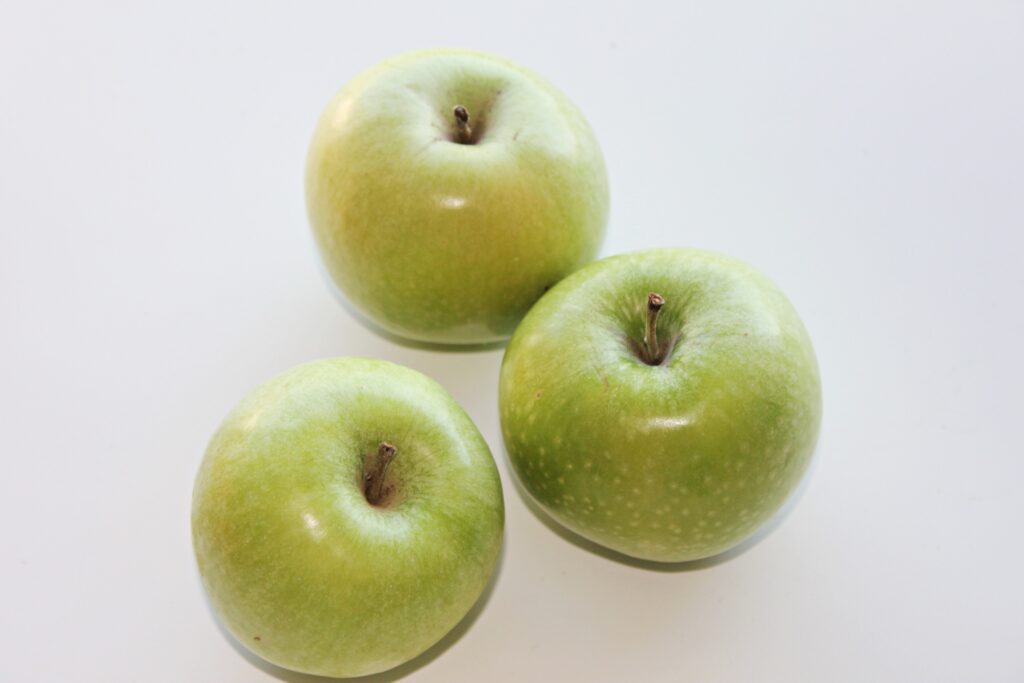Hey fruit fans! 🍍🍊🍋🍌🍏
Have you ever thought about why fruits are called nature’s candy? Well, let’s explore five awesome fruits that aren’t just tasty but also full of vitamins that can make you healthier!
In this blog post, we’ll talk about the great things Pineapple, Mandarin, Lemon, Banana, and Green Apple can do for your health. These fruits are like tiny vitamin powerhouses, all set to boost your well-being. So, sit tight, and let’s learn more about these amazing fruits!
Pineapple: The Tropical Powerhouse

- High in Vitamin C: Pineapples are an excellent source of vitamin C, which is a powerful antioxidant that helps boost the immune system, fight inflammation, and promote skin health.
- Contains Bromelain: Bromelain is a mixture of enzymes found in pineapple, known for its anti-inflammatory properties. It may help reduce inflammation, alleviate symptoms of arthritis, and aid in digestion by breaking down proteins.
- Promotes Digestive Health: The bromelain content in pineapples may support digestive health by assisting in the breakdown of proteins and improving digestion. Eating pineapple may help alleviate symptoms of indigestion and bloating.
- Rich in Fiber: Pineapples are a good source of dietary fiber, which promotes digestive regularity, helps prevent constipation, and supports a healthy gut microbiome.
- May Aid in Immune Function: With its high vitamin C content, pineapples can help strengthen the immune system, reducing the risk of infections and supporting overall health.
- May Improve Bone Health: Pineapples contain manganese, a trace mineral essential for bone health. Adequate manganese intake may help maintain strong and healthy bones.
- May Aid in Weight Loss: Pineapples are low in calories and rich in water and fiber, making them a filling and satisfying snack. Incorporating pineapples into a balanced diet can support weight management goals.
- Promotes Hydration: Pineapples have high water content, which can help keep you hydrated and support overall hydration status.
Mandarin: Little Gems of Vitamin C

- Promotes Relaxation: Mandarins contain magnesium, a mineral known for its relaxing properties. Consuming mandarins may help reduce stress and promote feelings of calmness and relaxation.
- Boosts Collagen Production: The vitamin C content in mandarins plays a vital role in collagen synthesis, which is crucial for maintaining healthy skin, hair, and nails. Eating mandarins may help improve skin elasticity and promote a youthful appearance.
- Reduces Allergy Symptoms: Quercetin, a flavonoid found in mandarins, exhibits anti-allergic properties and may help reduce symptoms of allergies such as sneezing, itching, and nasal congestion.
- Supports Bone Health: Mandarins contain calcium and vitamin K, both of which are essential for maintaining strong and healthy bones. Consuming mandarins may help improve bone density and reduce the risk of osteoporosis.
- Anti-Inflammatory Properties: Mandarins contain compounds with anti-inflammatory properties, such as flavonoids and phenolic acids, which may help reduce inflammation in the body and alleviate symptoms of inflammatory conditions such as arthritis and asthma.
- Improves Respiratory Health: The essential oils present in mandarins have expectorant properties that can help alleviate respiratory symptoms such as coughing and congestion. Drinking mandarin tea or inhaling mandarin essential oil vapor may provide relief from respiratory discomfort.
- Aids in Detoxification: Mandarins contain antioxidants and dietary fiber, which support the body’s natural detoxification processes by eliminating toxins and waste products from the body. Including mandarins in your diet may help cleanse and rejuvenate your system.
Lemons: The Zesty Immune Booster

- Rich in Vitamin C: Lemons are an excellent source of vitamin C, a powerful antioxidant that supports the immune system, helps protect cells from damage caused by free radicals, and promotes skin health.
- Aids Digestion: The citric acid in lemons may help stimulate digestive enzymes and promote healthy digestion. Drinking lemon water or consuming lemon juice before meals can help alleviate symptoms of indigestion, bloating, and constipation.
- Alkalizes the Body: Despite their acidic taste, lemons have an alkalizing effect on the body once metabolized. Maintaining a slightly alkaline pH balance can support overall health and reduce the risk of chronic diseases.
- Promotes Skin Health: The vitamin C and antioxidants in lemons help promote collagen production, which is essential for healthy skin. Applying lemon juice topically or consuming it internally can help reduce inflammation, promote wound healing, and improve skin texture and appearance.
- Supports Weight Loss: Drinking lemon water may aid in weight loss and weight management by promoting feelings of fullness, reducing appetite, and increasing metabolism. The high vitamin C and fiber content of lemons also support digestive health and may help regulate blood sugar levels.
- Detoxifies the Body: Lemons are often touted for their detoxifying properties. While more research is needed to confirm these claims, consuming lemon water or lemon juice may help flush toxins from the body, support liver function, and promote overall detoxification.
- Improves Oral Health: The citric acid in lemons has antibacterial properties that can help kill harmful bacteria in the mouth and reduce the risk of cavities, gum disease, and bad breath. However, it’s essential to rinse your mouth with water after consuming lemon juice to prevent enamel erosion.
Bananas: Potassium-Packed Energy Boosters

- Rich in Nutrients: Bananas are loaded with essential vitamins and minerals, including potassium, vitamin C, vitamin B6, manganese, and dietary fiber.
- Excellent Source of Potassium: Potassium is crucial for heart health, muscle function, and maintaining proper fluid balance in the body. Bananas are one of the best natural sources of potassium, which helps regulate blood pressure and reduce the risk of stroke.
- Supports Digestive Health: Bananas are rich in dietary fiber, particularly soluble fiber, which aids digestion, promotes regular bowel movements, and supports gut health. They can help alleviate constipation and promote the growth of beneficial gut bacteria.
- Provides Energy: Bananas are a convenient and energy-dense snack, making them an excellent source of fuel for physical activity. The natural sugars in bananas, such as glucose, fructose, and sucrose, provide a quick energy boost and help replenish glycogen stores after exercise.
- May Improve Heart Health: The potassium, fiber, and antioxidants in bananas contribute to heart health by lowering blood pressure, reducing the risk of heart disease, and improving cholesterol levels.
- Regulates Blood Sugar Levels: Despite their natural sweetness, bananas have a low glycemic index, meaning they have a minimal effect on blood sugar levels. The fiber and resistant starch in bananas help slow down the absorption of sugar into the bloodstream, making them suitable for individuals with diabetes or those looking to manage blood sugar levels.
- Promotes Weight Loss: Bananas are relatively low in calories but high in fiber, making them a filling and satisfying snack. Incorporating bananas into a balanced diet can help control appetite, reduce cravings for unhealthy snacks, and support weight loss goals.
- Supports Kidney Health: Potassium plays a vital role in kidney function by helping to regulate fluid balance and electrolyte levels in the body. Consuming potassium-rich foods like bananas may help prevent kidney stones and protect against kidney disease.
Green Apples: Fiber-Rich Digestive Allies

- Rich in Dietary Fiber: Green apples are a good source of dietary fiber, including both soluble and insoluble fiber. Fiber promotes digestive health by preventing constipation, supporting regular bowel movements, and feeding beneficial gut bacteria.
- Low in Calories: Green apples are relatively low in calories but high in volume and fiber, making them a filling and satisfying snack option for those watching their calorie intake or trying to lose weight.
- Promotes Heart Health: The soluble fiber found in green apples, particularly pectin, can help lower cholesterol levels by binding to cholesterol in the digestive tract and promoting its excretion. Lowering cholesterol levels may reduce the risk of heart disease and stroke.
- Regulates Blood Sugar Levels: The fiber content in green apples helps slow down the absorption of sugar into the bloodstream, preventing rapid spikes and crashes in blood sugar levels. This can be beneficial for individuals with diabetes or those trying to manage their blood sugar levels.
- Supports Weight Management: Green apples are a nutrient-dense, low-calorie food that can help control appetite, reduce cravings for unhealthy snacks, and support weight loss goals when incorporated into a balanced diet.
- Rich in Antioxidants: Green apples contain antioxidants such as flavonoids and polyphenols, which help protect cells from damage caused by free radicals and oxidative stress. Antioxidants have anti-inflammatory properties and may reduce the risk of chronic diseases such as cancer and heart disease.
- Promotes Dental Health: Chewing crunchy green apples stimulates saliva production, which helps neutralize acids in the mouth and wash away food particles and bacteria, reducing the risk of tooth decay and gum disease.
- Supports Hydration: Green apples have high water content, which helps keep the body hydrated and contributes to overall hydration status, especially when consumed as part of a balanced diet.
More Articles from NutriQuorum
5 Super Foods You Need To Know About
My Top Superfoods To Consider For Your Daily Diet
Eco-Friendly Kitchen Hacks: DIY Fruit and Vegetable Wash
7 Secret Powers of Goji Berries





